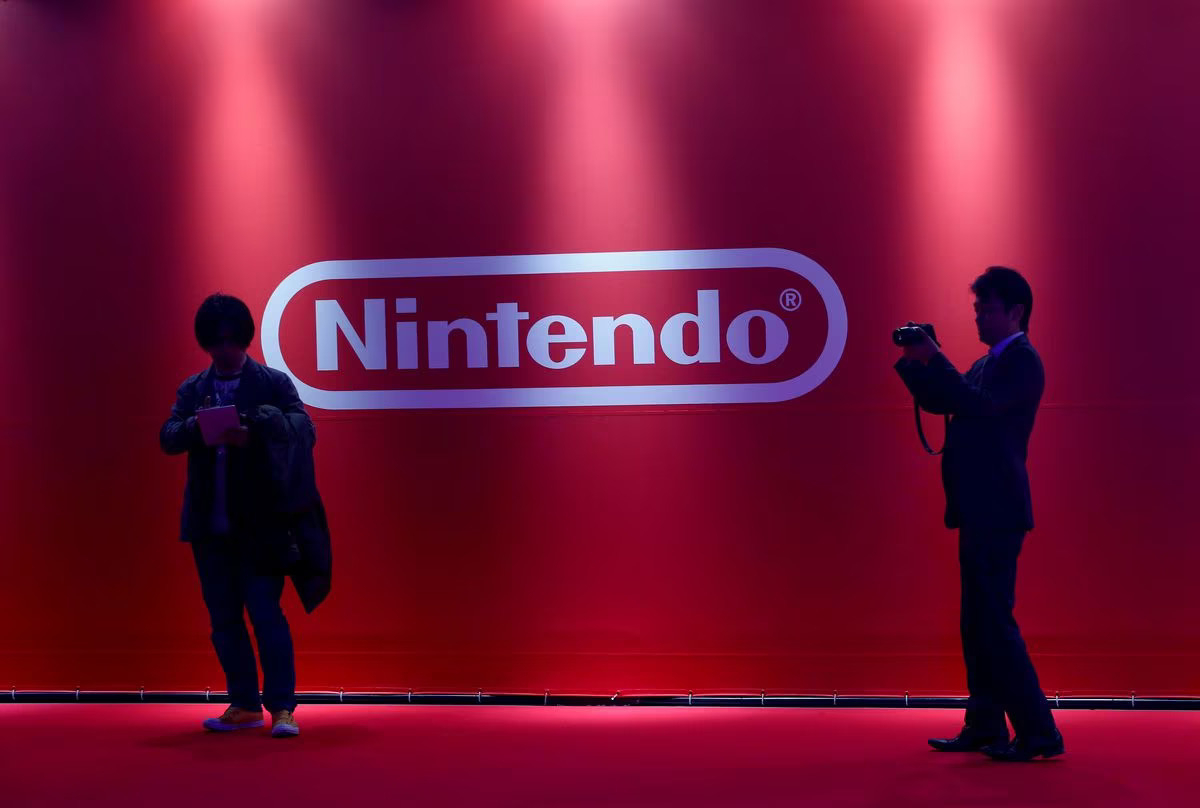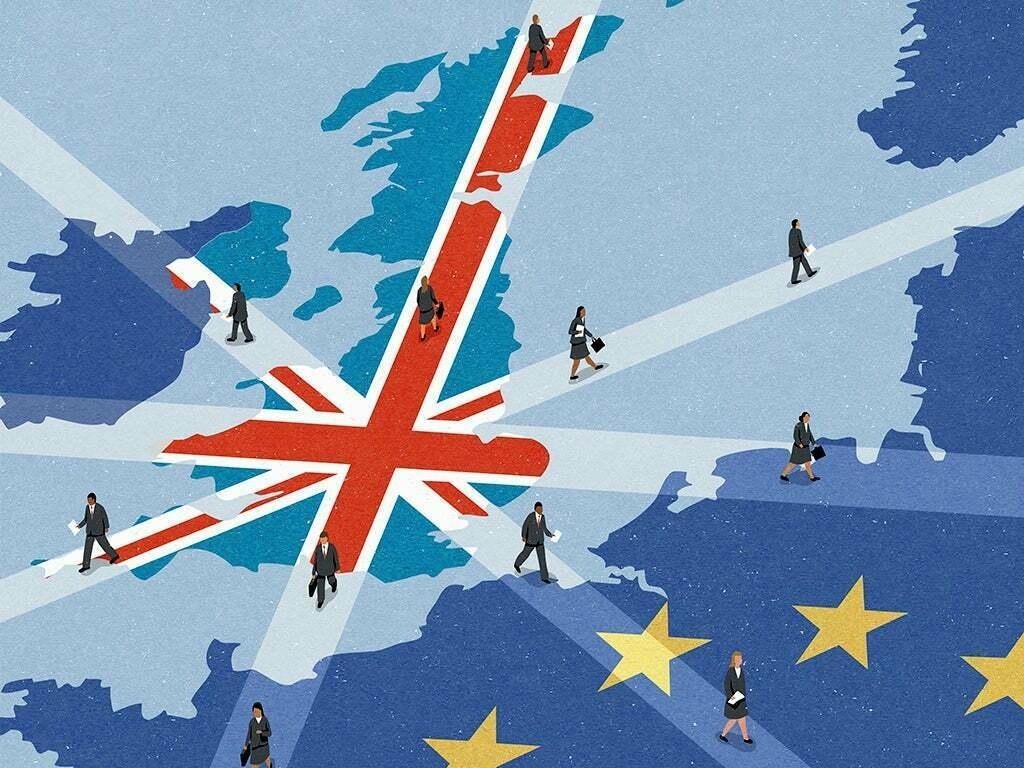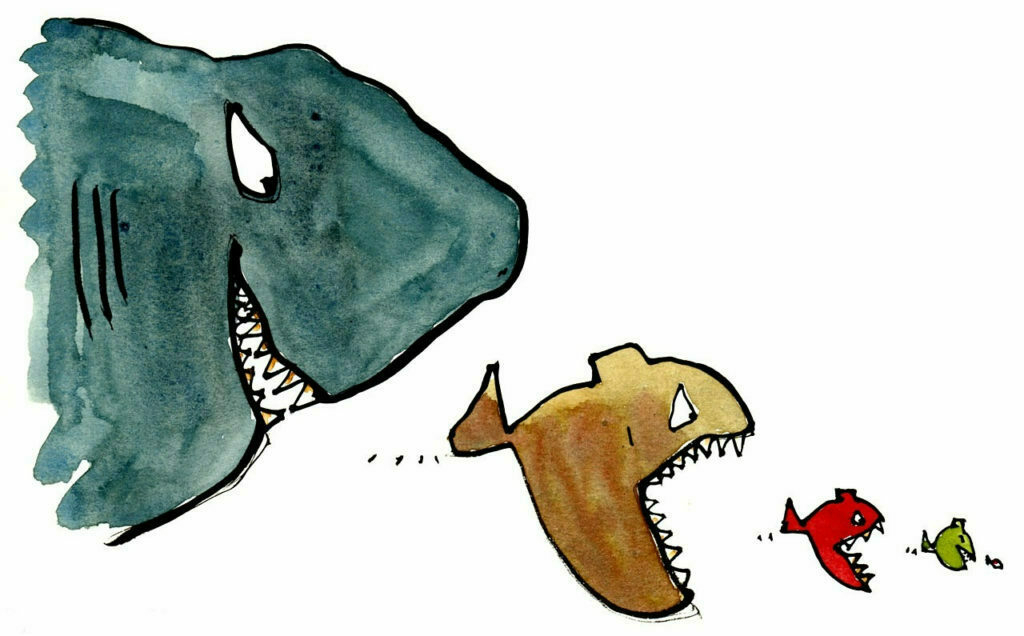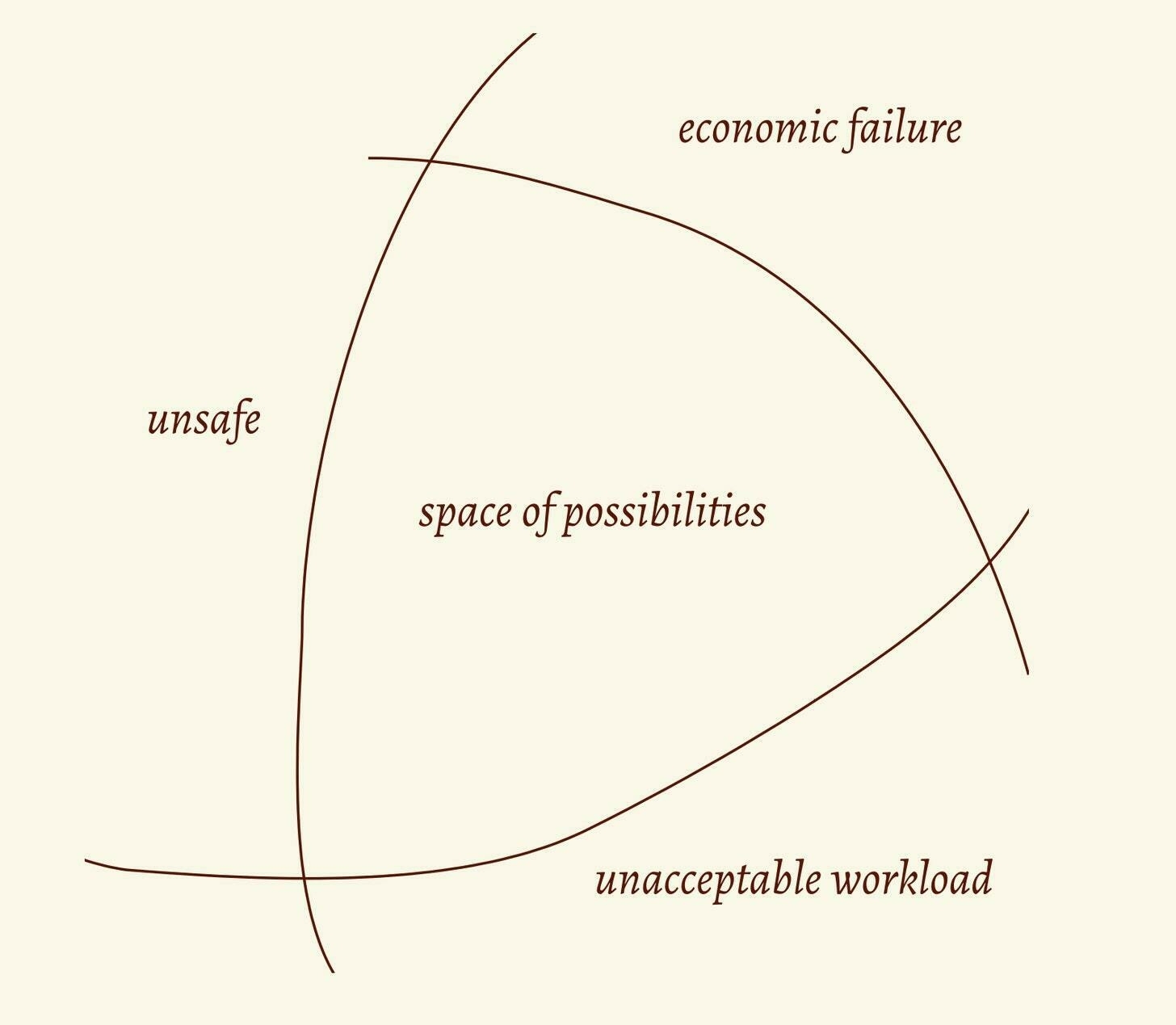- You Should Own Your Favorite Books in Hard Copy (Lifehacker) — "Most importantly, when you keep physical books around, the people who live with you can browse and try them out too."
- How Creative Commons drives collaboration (Vox) "Although traditional copyright protects creators from others redistributing or repurposing their works entirely, it also restricts access, for both viewers and makers."
- Key Facilitation Skills: Distinguishing Weird from Seductive (Grassroots Economic Organizing) — "As a facilitation trainer the past 15 years, I've collected plenty of data about which lessons have been the most challenging for students to digest."
- Why Being Bored Is Good (The Walrus) — "Boredom, especially the species of it that I am going to label “neoliberal,” depends for its force on the workings of an attention economy in which we are mostly willing participants."
- 5: People having fun on the internet (Near Future Field Notes) — "The internet is still a really great place to explore. But you have to get back into Internet Nature instead of spending all your time in Internet Times Square wondering how everything got so loud and dehumanising."
- The work of a sleepwalking artist offers a glimpse into the fertile slumbering brain (Aeon) "Lee Hadwin has been scribbling in his sleep since early childhood. By the time he was a teen, he was creating elaborate, accomplished drawings and paintings that he had no memory of making – a process that continues today. Even stranger perhaps is that, when he is awake, he has very little interest in or skill for art."
- The Power of One Push-Up (The Atlantic) — "Essentially, these quick metrics serve as surrogates that correlate with all kinds of factors that determine a person’s overall health—which can otherwise be totally impractical, invasive, and expensive to measure directly. If we had to choose a single, simple, universal number to define health, any of these functional metrics might be a better contender than BMI."
- How Wechat censors images in private chats (BoingBoing) — "Wechat maintains a massive index of the MD5 hashes of every image that Chinese censors have prohibited. When a user sends another user an image that matches one of these hashes, it's recognized and blocked at the server before it is transmitted to the recipient, with neither the recipient or the sender being informed that the censorship has taken place."
- It's Never Too Late to Be Successful and Happy (Invincible Career) — "The “race” we are running is a one-person event. The most important comparison is to yourself. Are you doing better than you were last year? Are you a better person than you were yesterday? Are you learning and growing? Are you slowly figuring out what you really want, what makes you happy, and what fulfillment means for you?"
- 'Blitzscaling' Is Choking Innovation—and Wasting Money (WIRED) — "If we learned anything from the dotcom bubble at the turn of the century, it’s that in an environment of abundant capital, money does not necessarily bestow competitive advantage. In fact, spending too much, to soon on unproven business models only heightens the risk that a company's race for global domination can become a race to oblivion."
- Deepfakes will influence the 2020 election—and our economy, and our prison system (Quartz) — “The problem doesn’t stop at the elections, however. Deepfakes can alter the very fabric of our economic and legal systems. Recently, we saw a deepfake video of Facebook CEO Mark Zuckerberg bragging about abusing data collected from users circulated on the internet. The creators of this video said it was produced to demonstrate the power of manipulation and had no malicious intent—yet it revealed how deceptively realistic deepfakes can be.”
- The Slackification of the American Home (The Atlantic) — “Despite these tools’ utility in home life, it’s work where most people first become comfortable with them. 'The membrane that divides work and family life is more porous than it’s ever been before,' says Bruce Feiler, a dad and the author of The Secrets of Happy Families. 'So it makes total sense that these systems built for team building, problem solving, productivity, and communication that were invented in the workplace are migrating to the family space'.”
- You probably don’t know what your coworkers think of you. Here’s how to change that (Fast Company) — “[T]he higher you rise in an organization, the less likely you are to get an accurate picture of how other people view you. Most people want to be viewed favorably by others in a position of power. Once you move up to a supervisory role (or even higher), it is difficult to get people to give you a straight answer about their concerns.”
- Sharing, Generosity and Gratitude (Cable Green, Creative Commons) — “David is home recovering and growing his liver back to full size. I will be at the Mayo Clinic through the end of July. After the Mayo surgeons skillfully transplanted ⅔ of David’s liver into me, he and I laughed about organ remixes, if he should receive attribution, and wished we’d have asked for a CC tattoo on my new liver.”
- Flexibility as a key benefit of open (The Ed Techie) — “As I chatted to Dames and Lords and fiddled with my tie, I reflected on that what is needed for many of these future employment scenarios is flexibility. This comes in various forms, and people often talk about personalisation but it is more about institutional and opportunity flexibility that is important.”
- Abolish Eton: Labour groups aim to strip elite schools of privileges (The Guardian) — “Private schools are anachronistic engines of privilege that simply have no place in the 21st century,” said Lewis. “We cannot claim to have an education system that is socially just when children in private schools continue to have 300% more spent on their education than children in state schools.”
- I Can't Stop Winning! (Pinboard blog) - “A one-person business is an exercise in long-term anxiety management, so I would say if you are already an anxious person, go ahead and start a business. You're not going to feel any worse. You've already got the main skill set of staying up and worrying, so you might as well make some money.”
- How To Be The Remote Employee That Proves The Stereotypes Aren’t True (Trello blog) — “I am a big fan of over-communicating in general, and I truly believe that this is a rule all remote employees should swear by.”
- I Used Google Ads for Social Engineering. It Worked. (The New York Times) — “Ad campaigns that manipulate searchers’ behavior are frighteningly easy for anyone to run.”
- Road-tripping with the Amazon Nomads (The Verge) — “To stock Amazon’s shelves, merchants travel the backroads of America in search of rare soap and coveted toys.”
- Prefer services over products
- Don't need to go to an office to work
- Are used to on-demand
- And are uber connected with vast computing power in their pocket.
- What excites you right now?
- What are you looking forward to?
- What’s the best thing that happened to you this year?
- Where did you grow up?
- What do you do for fun?
- Who is your favorite superhero?
- Is there a charitable cause you support?
- What’s the most important thing I should know about you?
Monetising a hobby is different to solving a difficult problem for people ready to pay
Life is never as simple as a 2x2 matrix, but they’re incredibly useful for helping illustrate a key message. In this post, Seth Godin uses one to make the obvious-if-you-think-about-it point that trying to monetise a hobby is a different thing to solving a difficult problem for a group of people who are willing to pay for a solution.
I’ve been thinking about this kind of thing a lot recently given the ongoing need for WAO business development. The advice, which I’m sure is extremely sound, is to find a group of people or type of organisation that you “wish to serve” and then find out as much about them as possible so you can solve their problem.
The trouble is that… doesn’t sound very interesting? Perhaps I’m wrong, and I reserve the right (as ever!) to change my mind, but I’d rather follow my interests and try and find aligned people and organisations willing to pay for the outputs.
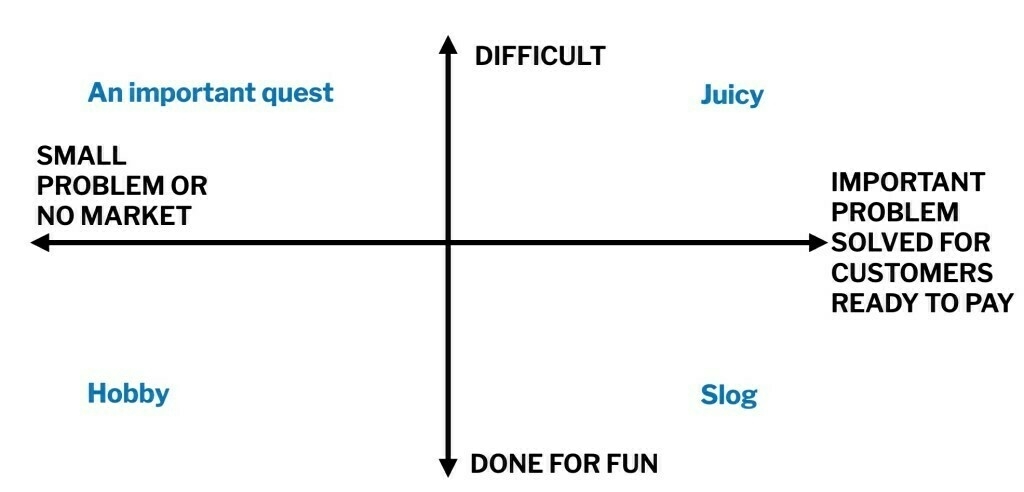
All too common are ‘fun’ businesses where someone finds a hobby they like and tries to turn it into a gig. While the work may be fun, the uphill grind of this sort of project is exhausting. If it’s something that lots of people can do and that customers don’t value that much, it might not be worth your time. Taking pictures, singing songs or playing the flute are fine hobbies, but hard to turn into paying jobs.Source: The slog, the hobby and the quest | Seth’s BlogOn the other hand, in the top right quadrant, there’s endless opportunity and plenty of work for people who can do difficult (unpopular) work that is highly valued by customers who are ready to pay to solve their problems. A forensic accountant gets more paid gigs than a bagpipe player.
Your personal time management strategy sucks
Too many pointless TLAs (Three Letter Acronyms) in this blog post, but it’s redeemed by having a core message that human beings are not cogs in a machine and have a finite time to accomplish their goals.
Although there have been plenty of people I’ve come across in my career who are always “super busy” there’s one person in my orbit in particular at the moment who seems to carry the world on their shoulders. As this post points out, this is due to an inability to focus on what’s important.
(The diagram below exudes peak 1990s management consultancy vibes, so I’m only including it for comedy value.)
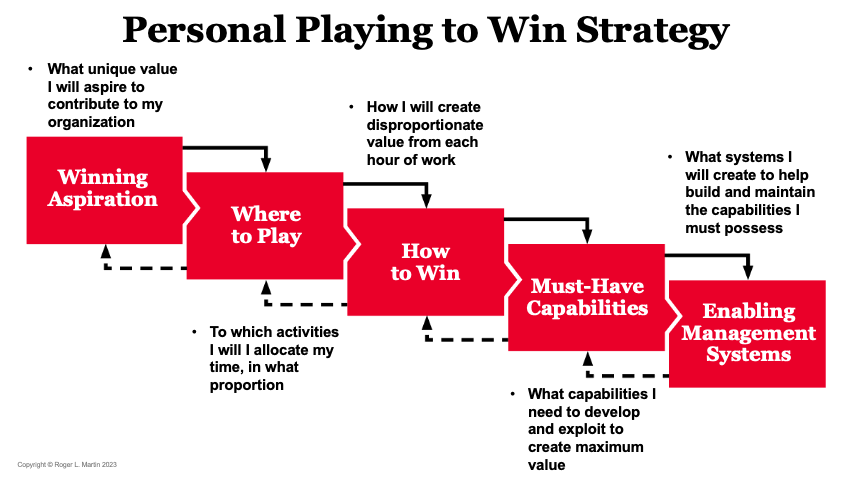
People inform me they are busy as if it is a badge of honor. For me, it is a signal that they have a weak personal Playing to Win strategy.Source: Being ‘Too Busy’ Means Your Personal Strategy Sucks | Roger Martin[…]
[T]o have an effective personal strategy, you need to be deliberative about choosing where to deploy your limited available hours in tasks that your particular set of capabilities enable you to generate a win by creating disproportionate value for your organization. And, since this doesn’t happen automatically, you need a personal management system for doing it on an ongoing basis — because on this front, eternal vigilance is the price of effectiveness.
[…]
Remember that strategy is what you do not what you say. So, even if you don’t think of yourself as having a personal Playing to Win strategy, step back and reverse engineer what it actually is based on what you actually do.
Buying when the market is selling
I love this. Nintendo is increasing the salaries of its employees even though it intends to make less of a profit. Short of giving everyone ownership, this is how you invest in your people during a downturn.
Nintendo plans to raise its employees' base pay by 10% this year in the wake of inflation. Reuters reported that Nintendo plans to raise salaries even as it reduced its profit expectation for the year. Nintendo previously cut its operating profit forecast from a projected 582 billion yen to 480 billion yen ($3.6 billion).Source: Nintendo Will Pay Its Workers 10% More ¬ GameSpotNintendo also amended its projected software and hardware sales. It projects that the Switch will sell 18 million units this year, as opposed to the prior forecast of 19 million. Similarly, it dropped the software sales forecast from 210 million units to 205 million. Nintendo re-affirmed that it does not currently have plan to raise prices for its consoles or games.
No benefits to post-Brexit deregulation
Coupled with the pandemic and the energy crisis, Brexit is absolutely destroying the UK at the moment. If you haven’t watched The Brexit Effect made by the Financial Times, then you really, really should.
This article in the New Statesman argues that the deregulation touted as a huge benefit of Brexit isn’t wanted or needed by most UK businesses. It’s the red tape added by being outside the EU single market that’s the problem.
Most businesses have no interest or understanding of the government’s plans for post-Brexit deregulation. And a majority of companies could not name a single EU law that they would change or remove to become more profitable, according to findings shared exclusively with the New Statesman by the British Chambers of Commerce.Source: Exclusive: Most UK businesses see no benefit in post-Brexit deregulation | New Statesman[…]
In a new survey of 938 businesses, made up largely of SMEs (and therefore representative of the UK economy), just 14 per cent specified an EU regulation they would remove; 58 per cent of firms had no preference over the amendment or removal of any EU regulation. Half said that deregulation is either a low priority or not a priority at all.
Hierarchy is bad for business
I think this is a great post for people who realise that there might be something wrong with the hierarchy-by-default way we run organisations and society. It’s hard not to come away from it feeling a little liberated.
As someone who has spent the last few years in a co-op with consent-based decision-making and a flat structure, however, I don’t buy the ‘hierarchy is here to stay’ nihilism. Instead, although it’s not what we’ve been brought up to be used to, something like sociocratic circles can scale infinitely!
Being an adult means not measuring yourself entirely on other people’s definition of success. Personal growth might come in the guise of a big promotion, but it also might look like a new job, a different role, a swing to management or back, becoming well-known as a subject matter expert, mentoring others, running an affinity group, picking up new skill sets, starting a company, trying your hand at consulting, speaking at conferences, taking a sabbatical, having a family, working part time, etc. No one gets to define that but you.Source: The Hierarchy Is Bullshit (And Bad For Business) | charity.wtf[…]
Why do people climb the ladder? “Because it’s there.” And when they don’t have any other animating goals, the ladder fills a vacuum.
But if you never make the leap from externally-motivated to intrinsically-motivated, this will eventually becomes a serious risk factor for your career. Without an inner compass (and a renewable source of joy), you will struggle to locate and connect with the work that gives your life meaning. You will risk burnout, apathy and a serious lack of fucks given..
The internet is broken because the internet is a business
I ended up cancelling my Verso books subscription because I was overwhelmed with the number of amazing books coming out every month. This looks like one to keep an eye out for.
Several decades into our experiment with the internet, we appear to have reached a crossroads. The connection that it enables and the various forms of interaction that grow out of it have undoubtedly brought benefits. People can more easily communicate with the people they love, access knowledge to keep themselves informed or entertained, and find myriad new opportunities that otherwise might have been out of reach.Source: The Privatized Internet Has Failed Us | JacobinBut if you ask people today, for all those positive attributes, they’re also likely to tell you that the internet has several big problems. The new Brandeisian movement calling to “break up Big Tech” will say that the problem is monopolization and the power that major tech companies have accrued as a result. Other activists may frame the problem as the ability of companies or the state to use the new tools offered by this digital infrastructure to intrude on our privacy or restrict our ability to freely express ourselves. Depending on how the problem is defined, a series of reforms are presented that claim to rein in those undesirable actions and get companies to embrace a more ethical digital capitalism.
There’s certainly some truth to the claims of these activists, and aspects of their proposed reforms could make an important difference to our online experiences. But in his new book ‘Internet for the People: The Fight for Our Digital Future’, Ben Tarnoff argues that those criticisms fail to identify the true problem with the internet. Monopolization, surveillance, and any number of other issues are the product of a much deeper flaw in the system.
“The root is simple,” writes Tarnoff: “The internet is broken because the internet is a business.”
Space of possibilities
In Andrew Curry’s latest missive, his ‘two things’ are Climate and Business. The diagram below is actually from the latter section, but I think it’s actually also very relevant for the former.
At his Roblog blog, Rob Miller has a short and engaging post on why businesses fail over time. I’m not sure it’s right, but it’s certainly interesting, and he tells the story through three diagrams.Source: 4 May 2022. Climate | Business - Just Two ThingsHe argues—following the work of Jens Rasmussen—that successful businesses operate in a safe space that sits between economic failure, on one side, lack of safety, on another, and overload, on a third.
Face-to-face university classes during a pandemic? Why?
Earlier in my career, when I worked for Jisc, I was based at Northumbria University in Newcastle. It's just been announced that 770 students there have been infected with COVID-19.
As Lorna Finlayson, a philosophy lecturer at the University of Essex, points out, the desire to get students on campus for face-to-face teaching is driven by economics. Universities are businesses, and some of them are likely to fail this academic year.
[A]fter years of pushing to expand online learning and “lecture capture” on the basis that it is what students want, university managers have decided that what students really want now, during a global pandemic, is face-to-face contact. This sudden-onset fetish reached its most perverse extreme in the case of Boston University, which, realising that many teaching rooms lack good ventilation or even windows, decided to order “giant air circulators”, only to discover that the air circulators were very noisy. Apparently unable to source enough “mufflers” for the air circulators, the university ordered Bluetooth headsets to enable students and teachers to communicate over the roar of machinery.
All of which raises the question: why? The determination to bring students back to campus at any cost doesn’t stem from a dewy-eyed appreciation of in-person pedagogy, nor from concerns about the impact of isolation on students’ mental health. If university managers had any interest in such things, they would not have spent years cutting back on study skills support and counselling services.
Lorna Finlayson, How universities tricked students into returning to campus (The Guardian)
I know people who work in universities in various positions. What they tell me astounds me; a callous disregard for human life in the pursuit of either economic survival, or profit.
This is, as usual, all about the money. With student fees and rents now their main source of revenue, universities will do anything to recruit and retain. When the pandemic hit, university managers warned of a potentially catastrophic loss of income from international student fees in particular. Many used this as an excuse to cut jobs and freeze pay, even as vice-chancellors and senior management continued to rake in huge salaries. As it turned out, international student admissions reached a record high this year, with domestic undergraduate numbers also up – perhaps less due to the irresistibility of universities’ “offer” than to the lack of other options (needless to say, staff jobs and pay have yet to be reinstated).
Lorna Finlayson, How universities tricked students into returning to campus (The Guardian)
But students are more than just fee-payers. They are rent-payers too. Rightly or wrongly, most of those in charge of universities have assumed that only the promise of face-to-face classes would tempt students back to their accommodation. That promise can be safely broken only once rental contracts are signed and income streams flowing.
I predict legal action at some point in the near future.
Friday federations
These things piqued my interest this week:
Image: Federation Square by Julien used under a Creative Commons license
Friday ferretings
These things jumped out at me this week:
Image from Guillermo Acuña fronts his remote Chilean retreat with large wooden staircase (Dezeen)
Aren’t you ashamed to reserve for yourself only the remnants of your life and to dedicate to wisdom only that time can’t be directed to business?
Once you remove the specific details from the lives of the ancients, their lives were remarkably like ours. Take today's title, for example, which is a quotation from Seneca. He knew what it was like to be so busy doing 'productive' things to the exclusion of almost everything else.
My good friend Laura Hilliger wears her heart on her sleeve, and is the most no-nonsense person I know. By observing the way she lives and works, I'm learning to set limits and say exactly what I think:
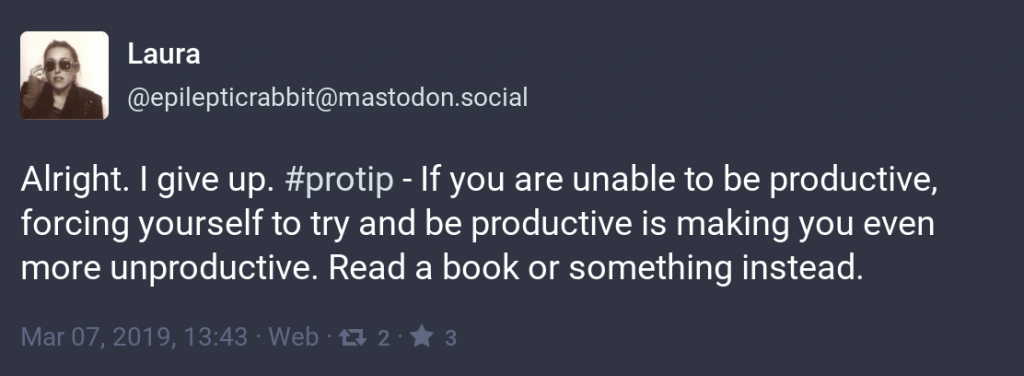
The thing is that western society, implicitly at least, assumes that people are 'fixed' in terms of their personality and likes. But that's just the way that we choose to see ourselves:
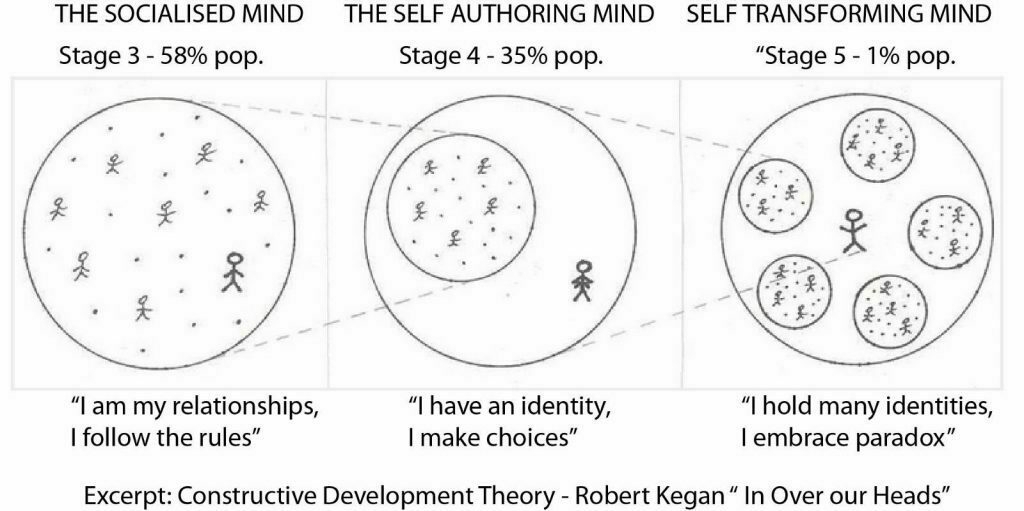
I feel that the biggest thing that constrains us is our view of how we think other people see us. That perceived expectation becomes internalised, creating a 'psychic prison' which becomes an extremely limited playground. For better or for worse, we perform the role of how we think other people have come to see us.
One way many people find to avoid responsibility for their life choices is to play the 'busy' card. They're too busy to make good decisions, to look after their mental and physical health, to ensure that they're doing your best work.
The trouble is, that's simply not true. We've got more free time than our parents and grandparents:
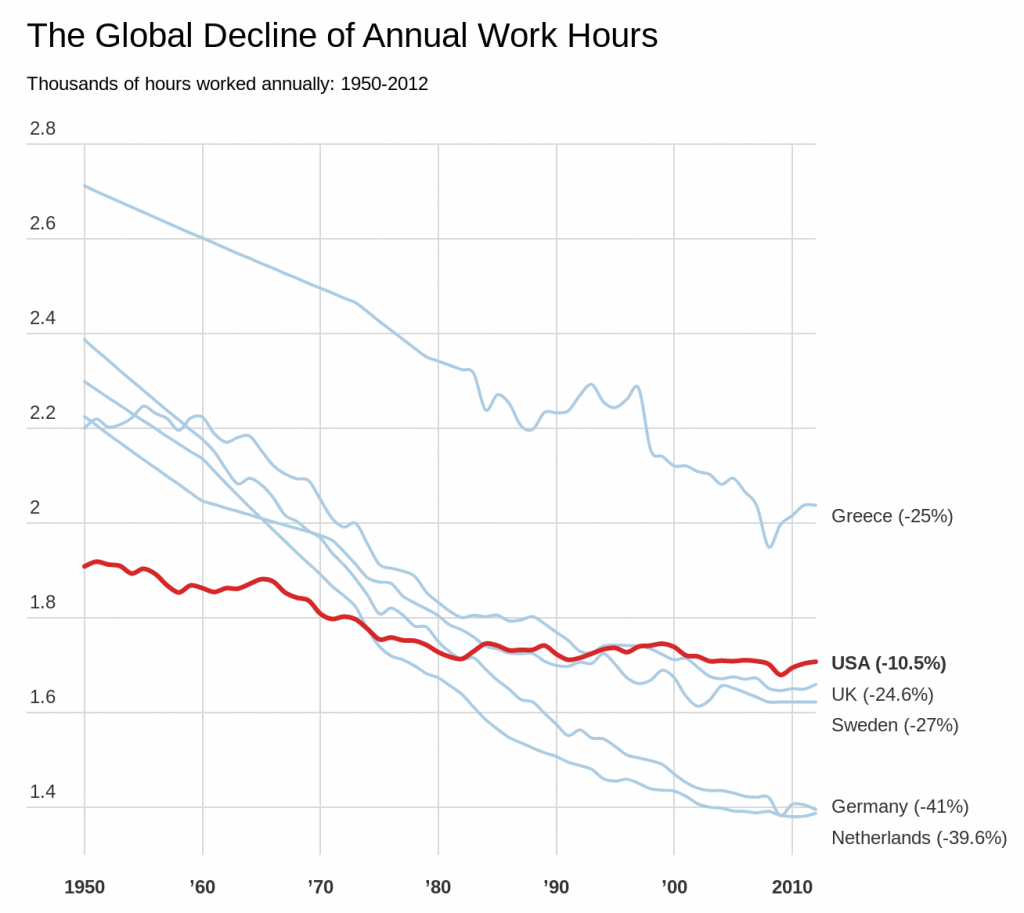
As the above chart demonstrates, it's not true that we actually work more hours. Instead, I think, it's that we're so concerned about how other people see us that we spend time doing things that feel like work but are mostly to do with presentation of self. Hence the amount of time spent on social networks like Instagram trying to create the highlights reel of our lives to show others.
One way of viewing this is that we've collectively internalised capitalism. The logic of the market has become as invisible to us as an ideology as water is to fish. In fact, some people say it's easier to imagine the end of the world than the end of capitalism!
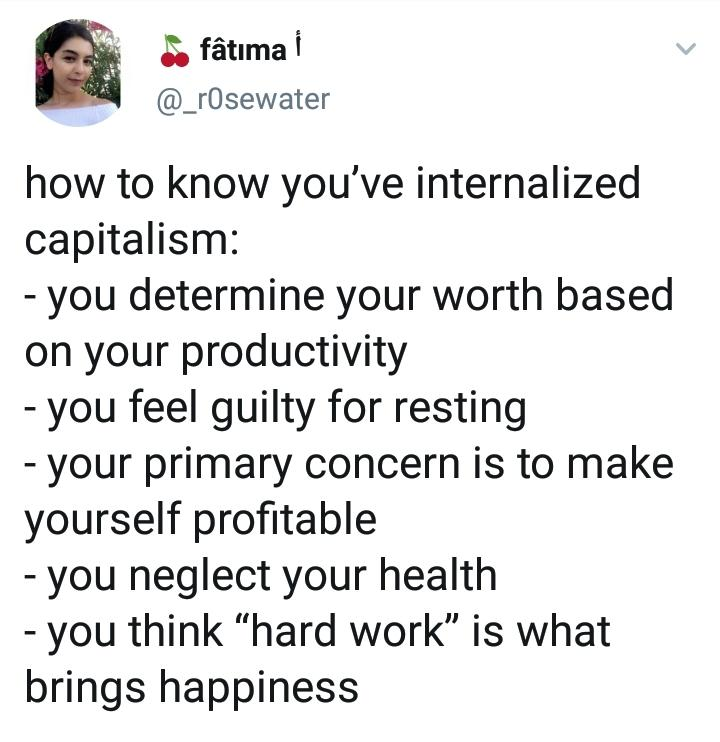
Of course, it's become something of a cliché in our pseudo-enlightened times to talk of capitalism as the meta-problem behind everything. But that doesn't make it any less true.
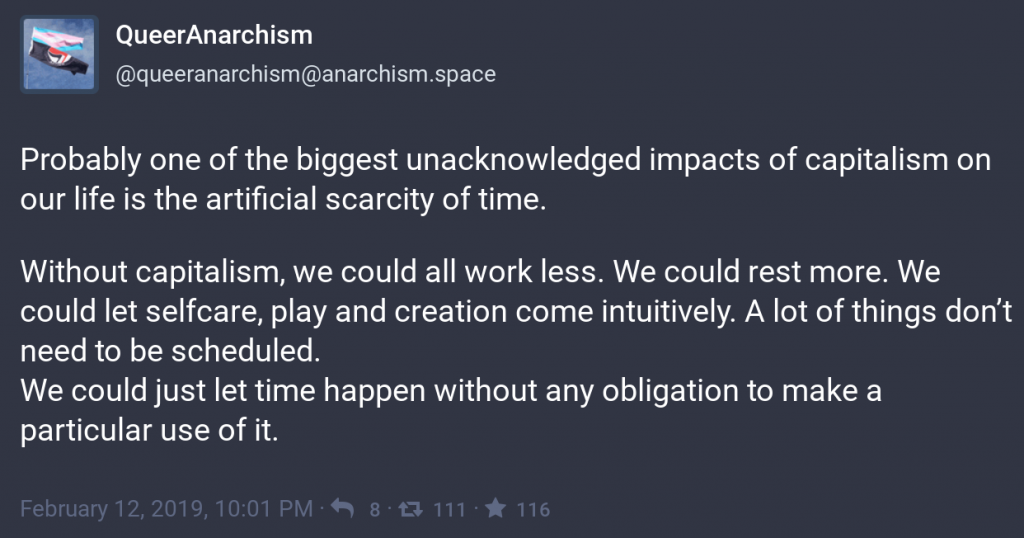
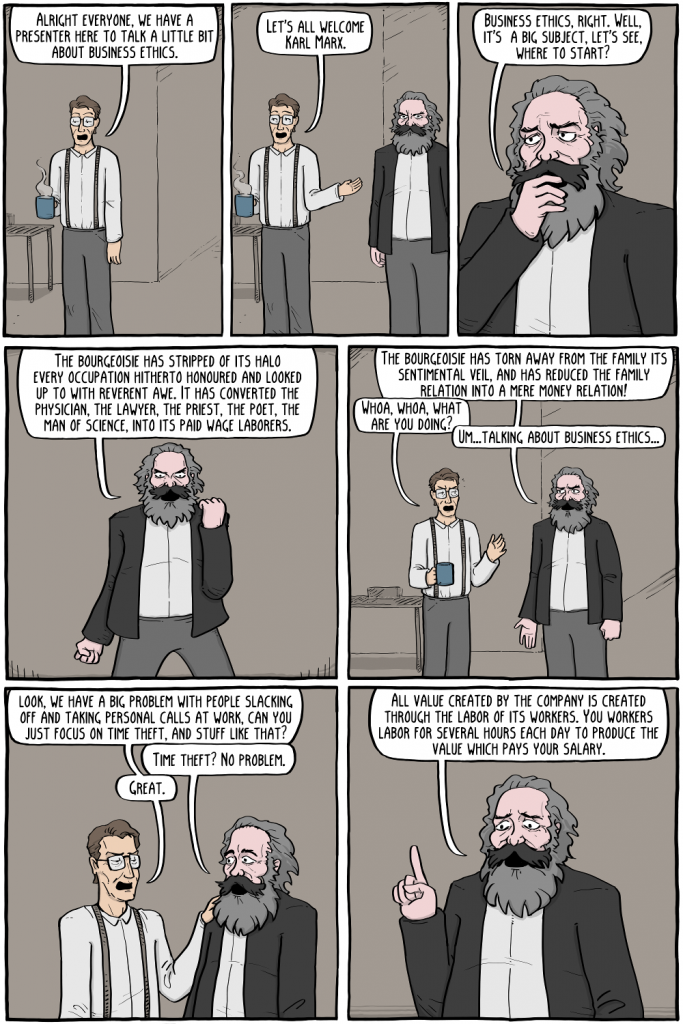
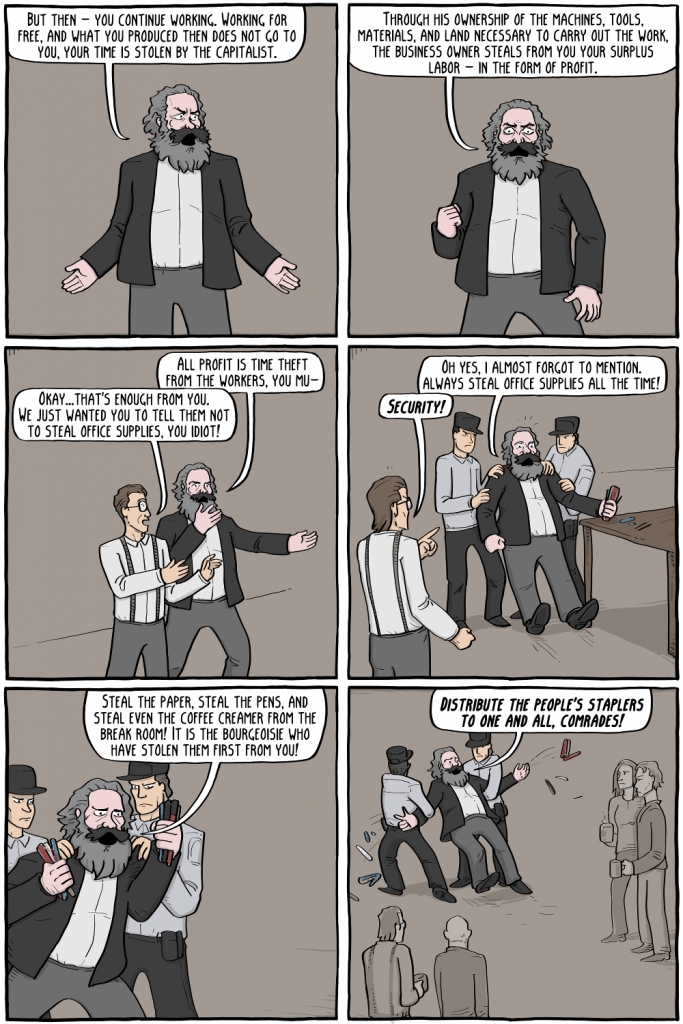
Our identity is mediated by the market, by what we produce instead of who we are. I keep coming back to a fantastic episode of Jocelyn K. Glei's Hurry Slowly podcast entitled Who Are You Without The Doing? in which she explains that we should learn to 'sit with ourselves', learning that change comes from within:
You have to completely conquer the feeling that there is something fundamentally wrong with your human nature, and that therefore you need discipline to correct your behavior. As long as you feel the discipline comes from the outside, there is still a feeling that something is lacking in you.
Jocelyn K. Glei
Derek Sivers uses the metaphor of 'doors' to explain where he finds value and wants to spend time doing. Some doors he opens and it helps him grow as a person and fosters positive relationships.
But one door is really no fun to open. I’m horrified at all the shouting, the second I open it. It’s an infinite dark room filled with psychologically tortured people, trying to get attention. Strangers screaming at strangers, starting fights. Businesses set up shop there, showing who’s said and done bad things today, because they make money when people get mad.
Derek Sivers
We keep wringing our hands about people's behaviour online, but it's that way for a reason. Hate is profitable for social networks:
Massive platforms like Facebook, Twitter, and YouTube “optimize for engagement,” and make automatic, algorithmic suggestions for every bit of content or action. From “you might also like” to “recommended just for you” to prioritizing things — anything — that will get you to click, comment, or share.
[...]
They know what will catch your attention. They know what will get you “engaged.” They know what will be more likely to lead you deeper into a rabbit hole, and what will make it harder to climb back out. Is it a literal, iron-clad trap? No. But the slippery, spiral path that leads people to the darkest corners of the internet is not an accident.
[...]
Hate is profitable. Conflict is profitable. Schadenfreude and shame are profitable. While we smugly point fingers, tsk-tsk, and think we’re being clever as we strategically dole out likes and shares, we forget that we are all just gruel-fed hamsters running on wheels deep inside giant, hyper-engineered, artificially intelligent, fully gamified, corporate-controlled virtual worlds that we absurdly think belong to us.
Ryan Ozawa
This all comes back to the time equation. Because we feel like we don't have enough time to curate things ourselves, we outsource that to others. That ends up with handing our information environments over to others to manipulate and control. It's curate or be curated.
Nobody cares about how much money you earn. Nobody cares how productive you are. Not really.
Also, without sounding harsh, nobody else cares how productive you are. Of course, productivity is important for important things, and “getting stuff done” or whatever, but it doesn’t define you in any way. What does is things like your sense of humour, where your passions lie, how you comfort a friend who’s upset, and that weird noise you make when the delivery guy calls you to say he’s outside with your food.
Leila Mitwally
The trouble is that we don't want to have this conversation, because it questions our identity, and everything we've been working for over our careers and throughout our lives:
But we don’t want to hear that because accepting this truth means asking a lot of complicated questions about our society, in which work is glorified as the pinnacle of self-expression, and personal earnings are viewed as a measure of merit and esteem.
Instead, we would instead read about buy into the idea that success in our work life is a merely a matter of being more productive. If you just follow the ‘right’ set of algorithms or rules, you too can achieve ‘success’ in your work life, along with fame and recognition and a fat bank account.
Richard Whittall
So, to finish, let me revisit a link I shared recently from Jason Hickel. We can choose to live differently, to recognise the abundance of time and resources we have in the world. To slow down, to take stock, and reject economic growth as in any way a useful indicator of human flourishing:
It doesn’t have to be this way. We can call a halt to the madness – throw a wrench in the juggernaut. By de-enclosing social goods and restoring the commons, we can ensure that people are able to access the things that they need to live a good life without having to generate piles of income in order to do so, and without feeding the never-ending growth machine. “Private riches” may shrink, as Lauderdale pointed out, but public wealth will increase.
Jason Hickel
It doesn't have to be difficult. We can just, as Dan Lyons mentions in his book Lab Rats, decide to work on things that 'close the gap' or 'increase the gap'. What that means to you, in your context, is a different matter.
The rise and rise of e-sports
I wouldn’t even have bothered clicking on this article if it weren’t for one simple fact: my son can’t get enough of this guy’s YouTube channel.
If you haven't heard of Ninja, ask the nearest 12-year-old. He shot to fame in March after he and Drake played Fortnite, the video game phenomenon in which 100 players are dropped onto an island and battle to be the last one standing while building forts that are used to both attack and hide from opponents. At its peak, Ninja and Drake's game, which also featured rapper Travis Scott and Pittsburgh Steelers receiver JuJu Smith-Schuster, pulled in 630,000 concurrent viewers on Twitch, Amazon's livestreaming platform, shattering the previous record of 388,000. Since then, Ninja has achieved what no other gamer has before: mainstream fame. With 11 million Twitch followers and climbing, he commands an audience few can dream of. In April, he logged the most social media interactions in the entire sports world, beating out the likes of Cristiano Ronaldo, Shaquille O'Neal and Neymar.This article in ESPN is testament to the work that Ninja (a.k.a. Tyler Blevins) has done in crafting a brand and putting in the hours for over a decade. It sounds gruelling:
Tyler can't join us until he wraps up his six-hour stream. In the basement, past a well-stocked bar, a pool table and a dartboard, next to a foosball table, he sits on this sunny August day in a T-shirt and plaid pajama pants at the most famous space in their house, his gaming setup. It doesn't look like much -- a couple of screens, a fridge full of Red Bull, a mess of wires -- but from this modest corner he makes millions by captivating millions.The reason for sharing this here is because I’m going to use this as an example of deliberate practice.[…]
In college, Jess [his wife] started streaming to better understand why Tyler would go hours without replying to her texts. A day in, she realized how consuming it was. “It’s physically exhausting but also mentally because you’re sitting there constantly interacting,” Tyler says. “I’m engaging a lot more senses than if I were just gaming by myself. We’re not sitting there doing nothing. I don’t think anyone gets that."
How does he stay so good? Pro tip: Don't just play, practice. Ninja competes in about 50 games a day, and he analyzes each and every one. He never gets tired of it, and every loss hits him hard. Hypercompetitive, he makes sure he walks away with at least one win each day. (He averages about 15 and once got 29 in a single day.)The article is worth a read, for several reasons. It shows why e-sports are going to be even bigger than regular sports for my children’s generation. It demonstrates how to get to the top in anything you have to put in the time and effort. And, perhaps, above all, it shows that, just as I’ve found, growing up spending time in front of screens can be pretty lucrative.“When I die, I get so upset,” he says. “You can play every single day, you’re not practicing. You die, and oh well, you go onto the next game. When you’re practicing, you’re taking every single match seriously, so you don’t have an excuse when you die. You’re like, ‘I should have rotated here, I should have pushed there, I should have backed off.’ A lot of people don’t do that."
Source: ESPN
Reduce your costs, retain your focus
The older I get, the less important I realise things are that I deemed earlier in life. For example, the main thing in life seems to be to find something you can find interesting to work on for a long period of time. That’s unlikely to be a ‘job’ but more like a problem to be solved values to exemplify and share.
Jason Fried writes on his company’s blog about the journey that they’ve taken over the last 19 years. Everyone knows Basecamp because it’s been around for as long as you’ve been on the web.
What is true in business is true in your personal life. I'm writing this out in the garden of our terraced property. It's approximately the size of a postage stamp. No matter, it's big enough for what we need, and living here means my wife doesn't have to work (unless she wants to) and I'm not under pressure to earn some huge salary.2018 will be our 19th year in business. That means we’ve survived a couple of major downturns — 2001, and 2008, specifically. I’ve been asked how. It’s simple: It didn’t cost us much to stay in business. In 2001 we had 4 employees. We were competing against companies that had 40, 400, even 4000. We had 4. We made it through, many did not. In 2008 we had around 20. We had millions in revenue coming in, but we still didn’t spend money on marketing, and we still sublet a corner of someone else’s office. Business was amazing, but we continued to keep our costs low. Keeping a handle on your costs must be a habit, not an occasion. Diets don’t work, eating responsibly does.
These days we have huge expectations of what life should give us. The funny thing is that, if you stand back a moment and ask what you actually need, there's never been a time in history when the baseline that society provides has been so high.So keep your costs as low as possible. And it’s likely that true number is even lower than you think possible. That’s how you last through the leanest times. The leanest times are often the earliest times, when you don’t have customers yet, when you don’t have revenue yet. Why would you tank your odds of survival by spending money you don’t have on things you don’t need? Beats me, but people do it all the time. ALL THE TIME. Dreaming of all the amazing things you’ll do in year three doesn’t matter if you can’t get past year two.
We rush around the place trying to be like other people and organisations, when we need to think about what who and what we’re trying to be. The way to ‘win’ at life and business is to still be doing what you enjoy and deem important when everyone else has crashed and burned.
Source: Signal v. Noise
Space as a service
This isn’t the most well-written post I’ve read this year, but it does point to a shift that I’ve noticed — perhaps because I work remotely.
Increasingly we are moving to an almost post consumer world where we are less bothered about accumulating more stuff and much more interested in being provided with services, experiences and ephemeral pleasures.Some might think that these are things ‘Millennials’ do, but if that generation is defined as those born from 1980 onwards then some of those are almost 40 years old. It’s not a trend that’s going away.So Uber instead of Cars, Spotify instead of CD’s, Netflix instead of DVD’s: on-demand this, on-demand that. Why bother to own something you seldom use, that becomes out of date rapidly, or that you really cannot afford. Rent it when you need it.
When you’re used to paying monthly for software, streaming music and films instead of buying them, and renting accommodation (because you’re priced out of the housing market), then you start thinking differently about the world.
Just as it is now easy to buy almost any Software as a Service, so it will become with real estate. Space, as a Service, is the future of real estate. On demand and where you buy exactly the features, and services, you need, whenever and wherever you are.So for businesses who employ people who can do most of what they do from anywhere, the problem becomes co-ordination rather than office space. Former Mozilla colleague John O’Duinn makes this point in his upcoming book.Key though is that this extends beyond spaces rented on-demand; regardless of tenure it will become important to be able to also rent or purchase on-demand all the services one might need to make the most of your space, or to enable the most productive use of that space.
We really do not NEED offices anymore, we really do not NEED shops anymore. In fact we really do not NEED an awful lot of real estate. That is not to say we don’t WANT these spaces, but what we do in them will change.So companies like WeWork are already huge, and continue to grow rapidly.
So how will all this change supply?I think this is a hugely exciting time. I'm just hoping that we see a similar revolution around equity, both in terms of diversity within organisations and shared ownership of them.Well you have people who:
The answer, to me, has to be #Space As a Service - space that takes account of these four trends. Space that is specifically designed to allow humans to do what they are good at.
Source: Antony Slumbers
So, what do you do?
Say what you want about teaching, it makes it extremely easy to answer the above question.
But that question might not be the best way to build rapport with someone else. In fact, it may be best to avoid talking about work entirely.It's better, apparently, to find shared ground about common goals and interests:
Research findings from the world of network science and psychology suggests that we tend to prefer and seek out relationships where there is more than one context for connecting with the other person. Sociologists refer to these as multiplex ties, connections where there is an overlap of roles or affiliations from a different social context. If a colleague at work sits on the same nonprofit board as you, or sits next to you in spin class at the local gym, then you two share a multiplex tie. We may prefer relationships with multiplex ties because research suggests that relationships built on multiplex ties tend to be richer, more trusting, and longer lastingThe author of this article suggests you can ask the following questions instead:
Unfortunately, unlike the ubiquitous, “So, do you do?” none of these are useful as conversation-starters. And then, after I’ve corrected for Britishness, there’s exactly zero I’d use in the course of serious adult conversation…
Source: Harvard Business Review
Ethical business means fair pay (and co-ownership?)
Partly a marketing move, for sure, but this move to ethical business is encouraging. See also Buffer’s transparent salary calculator. The next move for companies like this would be for employees to be co-owners.
Starting 2018, Basecamp is paying everyone as though they live in San Francisco and work for a software company that pays in the top 10% of that market (compared to base pay + bonus, but not options).Source: Signal v. NoiseWe don’t actually have anyone who lives in San Francisco, but now everyone is being paid as though they did. Whatever an employee pockets in the difference in cost of living between where they are and the sky-high prices in San Francisco is theirs to keep.
This is not how companies normally do their thing. I’ve been listening to Adam Smith’s 1776 classic on the Wealth of Nations, and just passed through the chapter on how the market is set by masters trying to get away with paying the least possible, and workers trying to press for the maximum possible. An antagonistic struggle, surely.
It doesn’t need to be like that. Especially in software, which is a profitable business when run with restraint and sold to businesses.
